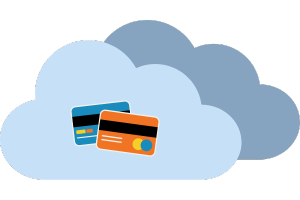Cash App has become one of the most prominent payment platforms in the market over the past few years. In fact, gross payment volume (GPV) on the platform reached an astonishing $51.12 billion in the first quarter of 2023—a 17% year-over-year boost [1]emarketer. “Cash App propels Block to a buoyant first quarter even as Square volume falls.” Accessed on August 6, 2024. . However, despite its widespread popularity, many businesses are looking for a Cash App alternative, largely because of a lack of merchant-specific functionality.
Cash for Business—Cash App’s merchant-intended offering—lacks advanced invoicing, reporting, and merchant services. Furthermore, the platform has limited integrations with accounting and CRM software. Larger scale operations are also hamstrung by hard transaction limits, starting at sending and receiving $250 a week and $1,000 a month for unverified users. So, it’s clear why a business might look for other apps like Cash App. That said, it’s also difficult to determine which payment solution is the ideal substitute. In the interest of informed decision-making, it’s important to comprehensively understand the potential replacements first.
Top 6 Cash App Alternatives for Your Business

There certainly isn’t a lack of options for those comparing Cash App alternatives—quite the opposite.
The difficulty isn’t finding an app like Cash App but finding the best payment solution for each business’s needs and structure.
As no two companies operate the same, there is no one-size-fits-all Cash App alternative. Each company will need to determine which features and functionalities are important to them when considering different payment solutions.
This isn’t to say that there aren’t a handful of stand-out platforms for savvy business owners to explore. Let’s unpack six widely regarded Cash App alternatives that many businesses consider more in line with their operational needs.
1. Zelle: The Quick and Convenient Payment Solution
In contrast to Cash App, Zelle is already integrated with thousands of banking apps across the US—meaning customers may not even need to have an account before making a purchase—so it might seem like a convenient business alternative. After all, users only need to know the other party’s phone number or email address to send funds, and transfers on the platform are typically completed in minutes.
Perhaps the biggest perk for Zelle business users is the lack of transaction fees, which allows companies to save significant costs. It’s also one of the most secure payment options, as personal information is not saved directly on the platform. Instead, user details remain hosted in their bank accounts.
However, despite these advantages, Zelle also has some limitations that may make it impractical for certain businesses. Unlike other leading payment platforms, it doesn’t offer protection policies to reimburse users for fraudulent transactions. And because of the app’s instantaneous transfers, some users may be unable to recover their funds if they fall prey to fraud. Furthermore, Zelle only operates within the US and with US-based banks, so there’s no option for international operations.
2. Venmo Business Accounts: Streamlining Transactions
Like Cash App, Venmo is another widely used predominantly P2P app with a business account feature. In fact, its wide use is a major selling point for many businesses. However, this isn’t the only reason a business might choose Venmo as an alternative to Cash App.
Low transaction fees set Venmo’s business accounts apart from many of its competitors. The platform charges a base rate of 1.9% plus 10 cents per transaction. Free transfers via Venmo typically take anywhere between one to three days, but instant transfers are available for an additional 1.75%.
In addition to the relatively beneficial fee structure Venmo boasts, the platform also offers QR code payment options, which allow customers to simply scan a company’s code through an app to remit payment.
The platform is also very user-friendly and easy to navigate, making it a good payment solution for customers who aren’t particularly tech-savvy. Venmo’s strengths are generally its convenience and reasonable rates, which help merchants improve their margins.
However, the platform also has some notable drawbacks. Much like Zelle, Venmo only operates in the US—so it’s not a practical solution for international companies. Moreover, the app charges a 3% fee to send funds via credit card.
But all in all, the platform’s popularity among customers, its relatively low fee structure, and additional user-centric features like QR codes are legitimately enticing to both large and small businesses.
3. PayPal: An All-in-One Financial Hub
Moreso than Cash App, PayPal is arguably the most established digital payment solution available today. Out of all the Cash App alternatives for businesses, it has perhaps the most extensive array of features and capabilities, including:
- Comprehensive invoicing
- CRM and account software integrations
- Reporting features
- Merchant services options
- An in-platform payment gateway
This makes PayPal business accounts a sound option for companies with more complex or robust accounting procedures. The platform has a fraud detection team and chargeback protection to create a secure environment for customers and merchants. Plus, PayPal supports global transactions through international payments and currency conversions—which, on top of higher transaction limits, makes the platform suitable for large-scale operations.
The platform integrates with eCommerce websites and allows users to customize their checkout experience to align with branding and design features.
However, the added functionality can be a double-edged sword for smaller businesses simply looking to transfer funds quickly and easily. PayPal has higher transaction fees than other less feature-rich platforms; transactions cost 3.49%, plus $0.49 if customers use a debit or credit card. So, there’s a trade-off between the added features that PayPal offers and the additional costs that come with them. Like all the other Cash App alternative options, PayPal is ideal for some businesses and less for others.
4. Square: Empowering Small Businesses With Tools
Square is often the go-to for retailers with in-person storefronts that need integration into larger digital payment and accounting systems. It stands out from the competition thanks to its POS hardware options and software solutions that pair with Square business accounts.
Square’s hardware ranges from a free magstripe reader (which comes with an account sign-up) to a top-shelf register that accepts a wide range of payments. In-person card payments, in particular, come with a 2.6% fee and $0.10 for every transaction; purchases conducted through eCommerce, online invoicing, or Square Online Checkout come at a slightly higher rate of 2.9% plus $0.30 per transaction.
On top of all these features, Square offers industry-specific services to restaurants and retailers. Square for Restaurants offers additional table and course management features; meanwhile, Square for Retail offers tailored vendor and purchase management solutions. The platform also includes many third-party integrations, payroll, marketing, and invoicing.
But certain aspects of the platform might make Cash App users pause—first and foremost, the costs of Square products. For example, the register charges $799 on top of transaction fees. These upfront costs can often lock users into a solution; business owners should ensure they want to use the platform long enough to justify hardware costs.
5. Paysley: Payment Anywhere Made Simple
Paysley is a newer Cash App alternative, but it’s capturing the attention of business owners.
The pay structure for Paysley for businesses starts with a flat monthly fee of $69 for an Express option and $99 for the upgraded Premier option [2]Paysley. “Pricing”. Accessed August 6, 2024.. Merchant services are quoted individually on top of this initial subscription fee; the platform also charges the following additional fees:
- $0.20 per transaction
- $0.03 per text (SMS)
- $0.05 per picture text (MMS)
- $0.02 per email
There’s also an enterprise pricing option with custom pricing.
The platform specializes in contactless payment solutions, including direct QR codes or tap-to-pay options on customers’ mobile devices. It allows businesses to send their patrons’ payment requests via text or email—which the customer can then complete without downloading apps or completing any registrations.
Paysley’s social commerce tools allow businesses to share a customized payment page on their social media accounts, thereby enabling direct payments. This system’s obvious benefit is the level of convenience it grants to the customer, who doesn’t need any prior familiarity with the payment platform to complete a transaction.
However, the novelty of the payment platform can create hesitation for customers, who are extra careful when sharing their personal and financial information online. That said, Paysley’s uniquely convenient structure has much to offer businesses.
6. Stripe: Accessible Payment Processing for Online Ventures
Stripe is a globally operated payment platform geared toward international online sales. It’s notable for its compatibility with an extensive array of payment types, including traditional debit and credit options, newer methods like Apple Pay and Google Pay, and international services such as Alipay in China, iDEAL in the Netherlands, and Boleto in Brazil.
Stripe charges a fee of 2.7% plus $0.05 for in-person transactions and 2.9% plus $0.30 for online transactions, which is generally in line with other Cash App alternatives.
The platform makes it easy to set up and manage recurring payments, making it a favorite solution for business models that rely on this payment structure. Beyond payment processing, Stripe offers a suite of additional financial services, including:
- Connect to manage payments in marketplaces
- Atlas for business incorporation
- Capital for financing options
The most notable feature of Stripe for businesses is its developer-centric approach. The platform offers robust APIs and extensive documentation that enable developers to integrate its payment processing capabilities seamlessly into various applications and websites. So long as a business has developers on staff—or can effectively outsource the task—users can create highly customized and branded payment experiences.
That being said, these intensely complex tools are not necessarily useful to the average business person. It takes significant coding skills to fully use the customization options the payment platform is best known for. Companies without access to this type of skillset might not be able to extract maximum value from Stripe.
Looking at the Features
No out-of-the-box payment processing platform is without its downsides. However, the key to finding the most suitable solution for each operation is comparing the platform’s features with the business’s needs.
This helps you weigh the strengths and weaknesses of the platform with the correct consideration. Here are features and functions that usually matter most to businesses in the long run—so you can vet your Cash App alternative appropriately.
- Transaction Fees: Different platforms have varying fee structures, including flat fees, percentage-based fees, or monthly subscription models. Over time, the slight differences in fee structures of Cash App alternatives can add up. Businesses may want to first analyze these costs in relation to their transaction patterns. Then, choose the most cost-effective solution.
- Integration Capabilities: Disjointed digital systems can create bottlenecks in any operation—and payment processing is no exception. Integration with vital operational components like accounting software, CRM, and eCommerce platforms is paramount. Make sure the chosen solution integrates with the existing software.
- Security: Cyber threats and fraud are all too commonplace in online payment processing platforms. Before creating an account, you must ensure the prevention and detection measures your Cash App implements are in line.
- Customer Support: Access to support becomes vital when a business account faces suspension or encounters an unexpected transaction error. Look into the customer support process for each potential Cash App alternative.
- Processing Speed: The amount of time it takes to complete transactions impacts a company’s liquidity—meaning processing speed is a key consideration.
Finding the Right Cash App Alternative for Your Business

Every business has a list of needs and unique factors they need to account for when looking into a new payment solution. It’s hard to find a prepackaged solution that exactly suits your needs without any downside. However, it is possible to find a solution from the leading options that more closely align with a company’s structure than Cash App.
Most businesses don’t want to settle for a flawed solution—and with an experienced provider, you don’t have to. PaymentCloud partners with merchants to integrate the most suitable payment gateway into our sales funnel. Businesses can specify the most important functionalities—and their dedicated account manager will find the perfect solution. If you’re interested in exploring mobile payment processing options beyond cookie-cutter solutions, contact us to discover the unique benefits we can offer your business!





